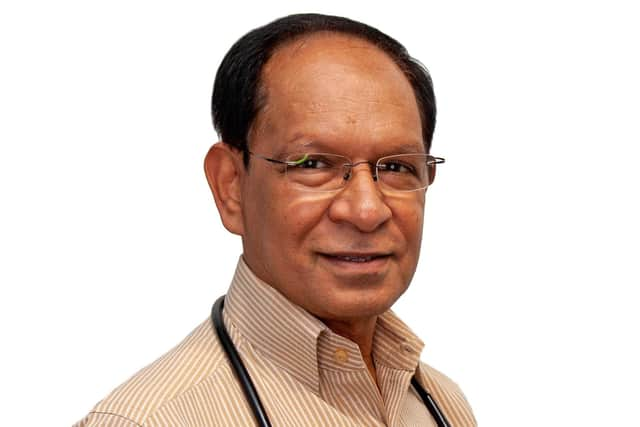Bid to free up beds in Wigan's hospitals after patients treated in corridors and waiting areas
and live on Freeview channel 276
It was a busy winter for staff at Wigan Infirmary and the other hospitals run by Wrightington, Wigan and Leigh Teaching Hospitals NHS Foundation Trust (WWL).
While the number of patients seeking care increases between November and January each year, the NHS was also faced with industrial action by junior doctors and the continued impact of the coronavirus pandemic.
Advertisement
Hide AdAdvertisement
Hide AdLast month, a whistle-blower revealed the extent of the problem in Wigan’s A&E, claiming patients were being placed in fire exits or under draughty windows and staff were becoming “overwhelmed”.


Prof Sanjay Arya, consultant cardiologist and medical director, said: “It was a very difficult time for WWL but also for the entire NHS. Every trust in Greater Manchester and most trusts in the country were struggling with the number of patients coming through the front door and the increased acuity of patients coming though the front door – very sick patients.
"As a result, we had patients sadly in corridors. In order to maintain safety, we started using our waiting areas because we didn’t want to leave patients not being seen quickly enough. We made sure they got care promptly, they had medical care quickly.
"Through the efforts of our medical team, there were many days when we managed to de-escalate our corridors and waiting areas.”
Advertisement
Hide AdAdvertisement
Hide AdDespite moving past the height of winter, Prof Arya says the demands of winter have continued throughout the year since the pandemic and the hospitals remain “very, very busy”.
That means staff have had to keep using corridors and waiting rooms to treat A&E patients.
"There are times when we have to escalate it,” he said. “I wouldn’t say that’s every day.
"But as soon as that happens, we make sure it is reduced to very minimal waiting times and we make sure patients get the best care, even if they are in corridors.”
Advertisement
Hide AdAdvertisement
Hide AdIn a bid to free up beds in other parts of the hospitals, so they can be available for patients arriving via A&E, a week-long initiative has been launched.
The Multi-Agency Discharge Event (MADE) began on Monday and involves hospital staff, along with professionals from across the health and social care sector.
The initiative is being supported by the Emergency Care Improvement Support Team (ECIST).
Prof Arya said: “All the executive teams are going on various medical, surgical, orthopaedic wards and we are carrying out a multi-disciplinary board round and trying to identify patients whose care we can expedite. There is a new system in place so that patients can have their investigation, their treatment, their assessment done quickly. Those who are ready to go home, we will look at how we can facilitate their discharge quickly.
Advertisement
Hide AdAdvertisement
Hide Ad"This started on Monday morning and I went on one medical and one surgical ward and have unlocked some of the processes to help discharge these patients.
"This is a system-wide event. There are social workers, there are physios, OTs, nurses and discharge co-ordinators. Everyone is discussing the patient together.
"We were already doing a lot of it before, but going forward this will become the norm and that will help our patient flow.”
It was not just patient numbers that had an impact during winter, but also strikes by junior doctors, including a six-day walkout at the beginning of January.
Advertisement
Hide AdAdvertisement
Hide AdProf Arya urged the British Medical Association and Department of Health to negotiate to find a resolution following both that industrial action and the dispute involving consultants.
He thanked the consultants who covered during the junior doctors’ strikes and the nursing staff for their efforts.
Prof Arya said: “The industrial action has not led to any patient safety incident. It has not led to any delayed care for patients admitted to the hospital as an emergency. But it has obviously led to the cancellation of outpatient appointments and routine work.”
Work to tackle waiting lists has been ongoing since some care was paused during the pandemic, with WWL eliminating waits of more than 65 and 78 weeks.
Advertisement
Hide AdAdvertisement
Hide AdAdditional clinics are being held, but Prof Arya urged patients to let their GP or the hospital know if their symptoms resolve and they no longer need treatment, so other people can be seen instead.
Now that winter has passed, attention is turning to the future, beginning with Easter.
Prof Arya said additional consultant ward rounds will be carried out and more diagnostic slots made available, so patients can get the care they need.
He asked Wigan residents to play their part in supporting the NHS over the bank holiday weekend by seeking healthcare in the most appropriate place, which could be from a pharmacist or GP rather than A&E.
Advertisement
Hide AdAdvertisement
Hide AdHe said: “Also, please don’t leave your prescription to the last minute, because there is a long bank holiday weekend. Please renew your prescriptions with your general practitioner on time, so you are not left without medication.”
WWL staff are also looking to the future, with Prof Arya welcoming the appointment of Mary Fleming as the trust’s new chief executive.
He said: “Mary has been working for WWL for many years. She knows the people not only within the organisation, but within the borough and Greater Manchester, very well. I wish her the very best in taking our trust to new heights in the coming months and years.”
Work has also started on extending the endoscopy unit at Wigan Infirmary, which is expected to take between 12 and 24 months.
It will provide single sex accommodation and bosses hope it will achieve JAG (Joint Advisory Group of GI Endoscopy) accreditation, which the endoscopy unit at Leigh Infirmary already has.